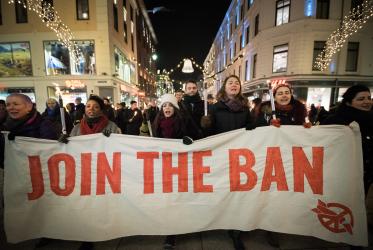The World Council of Churches (WCC) has for decades been calling for a world free from nuclear weapons. As the International Campaign to Abolish Nuclear Weapons (ICAN), a WCC partner, received the Nobel Peace Prize over the weekend, WCC leaders reflected on the next steps to build on momentum toward ridding the world of nuclear weapons.
“That award was particularly given because of the role of the International Campaign to Abolish Nuclear Weapons in the establishment of a new treaty to prohibit nuclear weapons,” said Peter Prove, director of the WCC Commission of the Churches on International Affairs.
“The World Council of Churches has been actively involved in this campaign and in those negotiations,” he said. “The achievement of that treaty represents a long-held dream for the World Council of Churches and the ecumenical movement.”
The Treaty on the Prohibition of Nuclear Weapons, which was adopted at the United Nations in July, bans the possession, use and threat of use of nuclear weapons. The WCC, which has been advocating for nuclear disarmament for most of its almost 70-year history, has been an active participant in ICAN since 2010.
At the First Assembly of the WCC in 1948 in Amsterdam, The Netherlands, the WCC described nuclear weapons as a “sin against God” and “a crime against humanity.” Again at the Sixth Assembly in Vancouver, Canada, the WCC called for a treaty to prohibit the use and possession of nuclear weapons.
“And that’s what this new treaty represents: a new standard, a new normative principal against nuclear weapons and calling for their total elimination,” said Prove. “Now some may say that this achievement is meaningless because nuclear weapons states do not support the treaty and have made clear their intention never to ratify it.”
But, he noted, the treaty creates a new standard, a new normative principal that seeks the elimination of the most destructive, most indiscriminate weapons that human beings have ever devised.
“A single nuclear weapon would cause untold, unprecedented and unconscionable damage and suffering that cannot be remediated, and it must be our purpose to try to ensure that they are never used again in any part of the world,” said Prove. “We have become used, though, to seeking protection under the so-called ‘nuclear umbrella.’ “
Some people believe that nuclear deterrence has played a role in preventing global war since the end of the Second World War, continued Prove. “But we have to ask ourselves whether the existence of nuclear weapons is a really a source of security or rather a source of permanent insecurity,” he said. “Although nuclear weapons arsenals have been reduced around the wold, we have tolerated the continued maintenance and development of ever-more destructive weapons systems in pursuit of that false security.”
Now - with the treaty - humankind has an instrument that de-legitimizes the continued possession, ownership, development and threat of use, as well as actual use, of nuclear weapons. “This is the objective that we surely must all work for,” said Prove. “So we are calling on member churches around the world to approach their governments, to call on their governments to sign and ratify this instrument, to create that that new normative principal instrument to work towards a world without nuclear weapons and no longer to tolerate their continued existence and the threat that they pose not only to humanity but to the entire creation.”
WCC work on nuclear arms control
Banning nuclear weapons, 122 governments take leadership where nuclear powers have failed (WCC press release, 8 July 2017)






